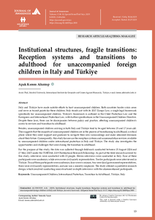Italy and Türkiye have made notable efforts to host unaccompanied children. Both countries border crisis areas and serve as transit points for these children. Italy stands out with its 2017 Zampa Law, a single legal framework specifically for unaccompanied children. Türkiye’s framework is outlined in the Child Protection Law and the Foreigners and International Protection Law, with further specifications in the Unaccompanied Children Directive. Despite these laws, there can be discrepancies between policy and practice, affecting unaccompanied children’s access to services and transition to adulthood.
Besides, unaccompanied children arriving in both Italy and Türkiye tend to be aged between 15 and 17 years old. This suggests that the majority of unaccompanied children are in the process of transitioning to adulthood, a critical phase where they need support and guidance to navigate their new surroundings and make informed decisions about their future. Consequently, this study focuses on the reception systems and accommodation services available to unaccompanied children under international protection in Italy and Türkiye. The study also investigates the opportunities and challenges that arise during the transition to adulthood.
For the purpose of this study, the data was collected through fieldwork conducted between 15 August 2024 and 27 May 2025 under the TUBİTAK 2219 Postdoctoral Research Fellowship. As part of the field research covered by this study, interviews were conducted with 23 people. Eleven interviews were conducted in Italy. Four of these participants were academics, while seven were civil society representatives. Twelve participants were interviewed in Türkiye. Two of these participants were academics, four were ex-minors, two were local government representatives, three were civil society representatives, and one was a ministry employee. The study utilized a qualitative research design, which involved conducting semi-structured in-depth interviews with the aforementioned participants.

